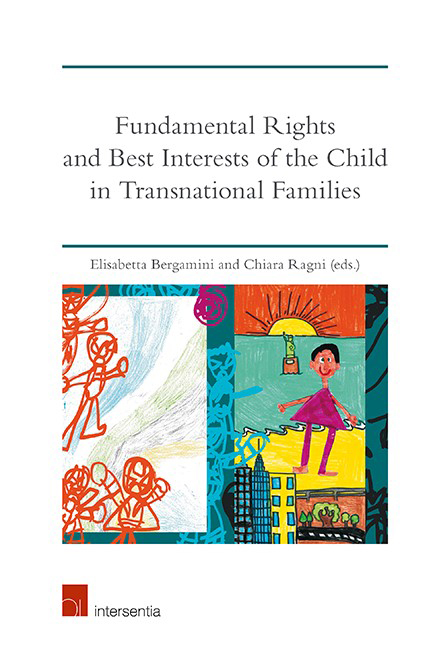Book contents
- Frontmatter
- Dedication
- Preface
- Acknowledgements
- Contents
- List of Cases
- List of Authors
- PART I THE IMPACT OF HUMAN RIGHTS AND OF THE BEST INTERESTS OF THE CHILD ON EU FREE MOVEMENT AND MIGRATION LAW
- PART II THE BEST INTERESTS OF THE CHILD AS A CONCERN OF HUMAN RIGHTS AND EUROPEAN PRIVATE INTERNATIONAL LAW
- The Place of Human Rights in the Private International Law of the Union in Family Matters
- The Best Interests of the Child Principle at the Intersection of Private International Law and Human Rights
- Recognition of a Foreign Status Filii: Pursuing the Best Interests Principle
- Surrogacy Arrangements and the Best Interests of the Child: The Case Law of the European Court of Human Rights
- Cross-Border Recognition of Adoption: Rethinking Private International Law from a Human Rights Perspective
- Protecting Children's Rights aft er Child Abduction: The Interaction of the CJEU and ECtHR in Interpreting Brussels II bis
- Cross-Border Parental Child Abduction in the EU: Is there Room for a Human Rights Exception?
- Impact of the Best Interests of the Child on the Brussels II ter Regulation
- Provisional Measures and the Best Interests of the Child in the Field of Parental Responsibility
- Index
- About the Editors
Recognition of a Foreign Status Filii: Pursuing the Best Interests Principle
from PART II - THE BEST INTERESTS OF THE CHILD AS A CONCERN OF HUMAN RIGHTS AND EUROPEAN PRIVATE INTERNATIONAL LAW
Published online by Cambridge University Press: 12 November 2019
- Frontmatter
- Dedication
- Preface
- Acknowledgements
- Contents
- List of Cases
- List of Authors
- PART I THE IMPACT OF HUMAN RIGHTS AND OF THE BEST INTERESTS OF THE CHILD ON EU FREE MOVEMENT AND MIGRATION LAW
- PART II THE BEST INTERESTS OF THE CHILD AS A CONCERN OF HUMAN RIGHTS AND EUROPEAN PRIVATE INTERNATIONAL LAW
- The Place of Human Rights in the Private International Law of the Union in Family Matters
- The Best Interests of the Child Principle at the Intersection of Private International Law and Human Rights
- Recognition of a Foreign Status Filii: Pursuing the Best Interests Principle
- Surrogacy Arrangements and the Best Interests of the Child: The Case Law of the European Court of Human Rights
- Cross-Border Recognition of Adoption: Rethinking Private International Law from a Human Rights Perspective
- Protecting Children's Rights aft er Child Abduction: The Interaction of the CJEU and ECtHR in Interpreting Brussels II bis
- Cross-Border Parental Child Abduction in the EU: Is there Room for a Human Rights Exception?
- Impact of the Best Interests of the Child on the Brussels II ter Regulation
- Provisional Measures and the Best Interests of the Child in the Field of Parental Responsibility
- Index
- About the Editors
Summary
INTRODUCTION
Recognising a status filii duly acquired abroad can be seen as a ground for legitimising family models capable of adversely affecting the notion of a traditional family. A bibliography on international family law indicates that the ‘family,’ conceptualised as a mere unit of society, is a constantly changing area of study, a ‘moving target’, as it were.
Legal analysis, through the prism of international law, is not called to ideologically endorse notions of the ‘traditional’ family or ‘untraditional’ family. Respect for both human and children's rights, as defined by international instruments, unavoidably impacts national family law, including its private international law (PIL) system, and national communities ‘basic ethical principles. As long as international agreements are binding, they are part of academic legal research, which also must consider how international courts apply these agreements. However, as suggested elsewhere, a human rights-based perspective on the recognition of foreign family status does not necessarily lead to a unique or universal concept of the family. As seen throughout this chapter, international human rights standards do not prevent States from enjoying some space for manoeuvre insofar as national legal orders do not share the same foundational values. It still holds true that the international judiciary instituted by human rights treaties, in principle, allows domestic law to protect the family in the traditional sense, a weighty and legitimate reason that may justify differences in treatment. Striking a balance between the role of the traditional family and international human rights standards is a delicate and difficult exercise. In this respect, critically evaluating both PIL systems and the international case law is necessary.
To begin with, under any system of conflict of laws, a foreign judgement or public act concerning a status filii can be prevented from producing effects in the forum if its recognition would be contrary to some predetermined requirements of the requested State. This is usually the case when the foreign authority (i.e. that of the State of origin) has not: (i) exercised jurisdiction according to the same criteria adopted by the national system of PIL (i.e. the national rules on jurisdiction); (ii) complied with the conflict of law rules of the forum; or (iii) issued a decision inconsistent with the forum doctrine of ordre public to cause manifest and serious harm to the fundamental principle of justice or morals characterising the requested State.
- Type
- Chapter
- Information
- Publisher: IntersentiaPrint publication year: 2019

